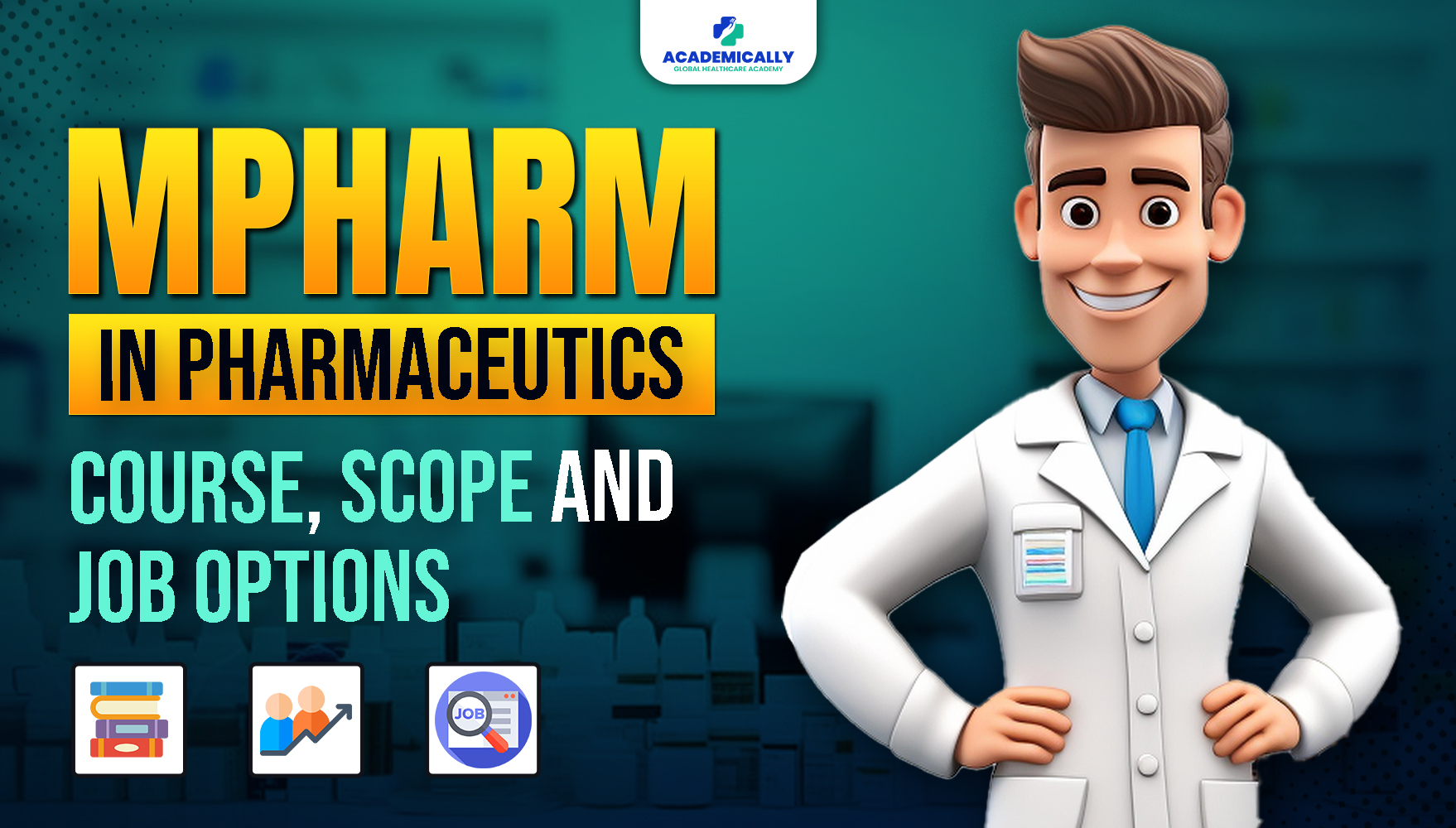MPharm in Pharmaceutics
Pharmaceutics specialization in M.Pharm is a study of the formulation of medicine from raw drugs. It involves understanding drug properties, formulation requirements, and ways of improving existing formulations.
It is a 2-year, full-time course. It involves both theory and lab-based experiments as per the PCI regulations.
Let’s understand in detail what M.Pharm in pharmaceutics is.
Course Overview
An M.Pharm in Pharmaceutics is a postgraduate program. It is designed to provide students with advanced knowledge and skills in the field of pharmaceutical sciences. The focus of the degree is on:
- Drug formulation
- Delivery systems
- Manufacturing processes
The syllabus of this course is centred around these topics.
M.Pharm Pharmaceutics Syllabus
The curriculum typically includes:
- Theoretical coursework
- Laboratory practicals
- Research projects
The main subjects are divided into 9 main categories:
Pharmaceutical Analytical Techniques:
Introduction to techniques used in pharmaceutical analysis.
- Spectroscopic methods:
- UV-Visible spectroscopy
- IR spectroscopy
- NMR spectroscopy
- Chromatographic techniques:
- High-performance liquid chromatography (HPLC)
- Gas chromatography (GC).
- Mass spectrometry, etc.
Drug Delivery System:
- Principles and concepts of drug delivery systems.
- Various drug delivery routes:
- Oral
- Transdermal
- Parenteral.
- Controlled release systems:
- Nanoparticles
- Liposomes
- Microspheres.
- Factors influencing drug release.
- Formulation requirements.
Modern Pharmaceutics:
- Fundamentals of pharmaceutics:
- Dosage form design
- Pharmaceutical excipients
- Formulation development.
- Pharmaceutical technology:
- Granulation
- Tablet compression
- Coating techniques
- Homogenization and sonication
- Lyophilization
- Manufacturing processes control
- Quality control and quality assurance
Regulatory Affairs:
- Overview of pharmaceutical industry rules and regulations
- Drug approval process
- Clinical trial process and requirements
- ICH Guidelines
- Good Manufacturing Practices (GMP)
- Good Laboratory Practices (GLP)
- Regulatory requirements for:
- Product testing
- Stability testing
- Drug labelling
- Packaging
- Marketing authorization.
Molecular Pharmaceutics:
- Introduction to molecular pharmaceutics and nanotechnology.
- Applications of nanotechnology in drug delivery systems.
- Targeted drug delivery systems:
- ligand-targeted nanoparticles
- antibody-drug complex
Biopharmaceutics & Pharmacokinetics:
- Principles of biopharmaceutics and pharmacokinetics.
- Drug ADME Profile: absorption, distribution, metabolism, and excretion
- Pharmacokinetic models.
- Bioavailability and bioequivalence studies.
Computer-Aided Drug Delivery System:
- Role of computational methods in drug delivery system design.
- Molecular modelling, molecular dynamics simulations
- QSAR studies.
- Virtual screening and rational drug design approaches.
Cosmetics and Cosmeceuticals:
- Introduction to cosmeceuticals.
- Formulation and development of cosmetic products.
- Regulatory requirements.
- Quality and safety assessment.
Research Methodology And Biostatistics:
- Research methodology:
- Study design
- Data collection and analysis
- Basics of biostatistics:
- Statistical tests
- Interpretation of data
- Literature review and scientific writing.
- Research ethics
Top Colleges in India
- Jamia Hamdard University
- Jawaharlal Nehru Technological University
- Delhi Institute of Pharmaceutical Sciences and Research
- Al Shifa College of Pharmacy
- JSS College of Pharmacy
Admission Process for M.Pharm Pharmaceutics
The admission to colleges for M.Pharm happens through the GPAT exam. This is a computer-based exam for pharmacy graduates. It is conducted by NBE on behalf of the PCI.
It is a 3-hour exam consisting of 120 multiple-choice questions. The cut-off marks change every year, but are normally around 130-140 marks for general category candidates.
Pharmaceutics is the top choice for most candidates. The highest-ranking students usually get this stream.
Career Opportunities for M.Pharm Pharmaceutics Graduates
Pharmaceutics covers a major part of the pharmaceutical industry. The scope of M.Pharm in pharmaceutics in India is huge. It reaches from research and academia to regulatory affairs and consulting. Students are equipped with the knowledge and skills required in many fields of work. We have highlighted a few of them here.
Drug Delivery Research:
This is one of the main arms of work for pharmaceutics graduates. They can get into research and development of new drugs and formulations. This includes not only lab work, but also preparing project documents like risk assessment, PDR, etc.
Quality Control and Assurance:
The quality control and assurance department of the pharmaceutical industry is another area of interest. This department ensures that the products being manufactured are compliant with regulatory standards. This department also ensures quality is maintained throughout the development and manufacturing stages. Here, graduates can work on outlining protocols, SOPs, etc.
Regulatory Affairs:
This department ensures that products meet the regulatory requirements. Graduates can work in regulatory affairs departments in industry or consulting firms. They communicate with regulatory agencies and prepare regulatory submissions. They also update the company on any updated regulatory requirements.
Academia and Teaching:
Some graduates pursue academic careers. Teaching undergraduate and postgraduate students in pharmacy schools is one of the professions they can get into. They can also be involved in research projects on campus.
Also Read: How Can an Indian Pharmacist Migrate to Australia
Job Options and Salaries for Pharmaceutics Graduates
Upon completion of an M.Pharm in Pharmaceutics, graduates have a wide range of job options to choose from. A few of them are listed here:
| Job Role | Salary Range (INR) |
| Formulation Scientist | 6–12 lakhs |
| Drug Delivery Research Scientist | 8–14 lakhs |
| Quality Control Officer | 6–8 lakhs |
| Regulatory Affairs Associate | 6–12 lakhs |
| Pharmaceutical Manufacturing Specialist | 15–20 lakhs |
| Analytical Development Scientist | 6–12 lakhs |
| Clinical Research Associate | 7–10 lakhs |
| Pharmaceutical Consultant | 9–14 lakhs |
| Research and Development (R&D) Scientist | 6–12 lakhs |
| Academician/Teacher in Pharmacy Schools | 10–15 lakhs |
Alternative Option
Pharmacy graduates can also pursue a career outside India right after graduation in countries like:
- Australia
- New Zealand
- Ireland
- USA
- Canada
They offer lucrative career options for pharmacists. Candidates need to take an assessment exam and complete an internship. After this, they are ready to begin their career.
Pharmacists outside have higher pay and more career opportunities.
If you are also thinking about working or studying abroad after graduation, connect with us.
We provide courses for the pharmacy exams for countries all over the globe.
| Country/Region | Pharmacy Exam |
| Ireland | PSI Pharmacy Equivalence Exam |
| Canada | PEBC Exam |
| United Kingdom | Overseas Pharmacists Assessment Programme |
| United States of America | FPGEE and NAPLEX Exam |
| Australia | OPRA Exam |
These are just a few options available for you after graduation. You can connect with our experts and clear any doubts.
Pharmaceutics is one of the most sought-after courses for M.Pharm aspirants. The M.Pharm in pharmaceutics course prepares students to address some of the most pressing needs in the pharmaceutical industry. From drug characterization to formulation development, they do it all.
This course is the backbone of the pharmaceutical industry. Pharmaceutics and biopharmaceutics are two of the most useful subjects in medicine.
Consider our courses, whether you want to prepare for your GPAT or want to pursue a career abroad. We have the solution for you.





